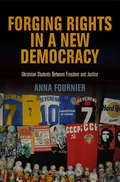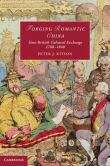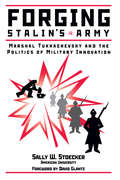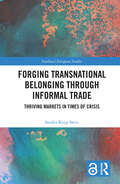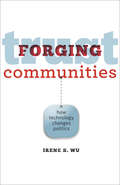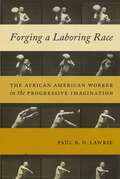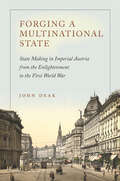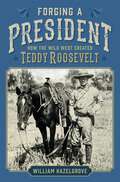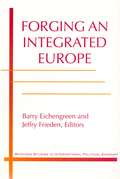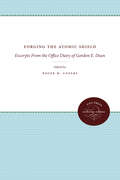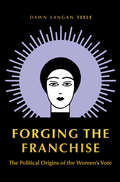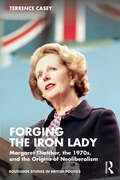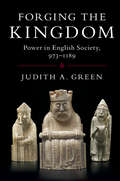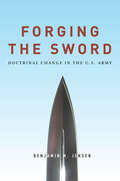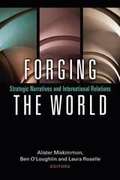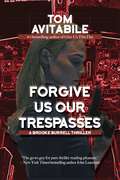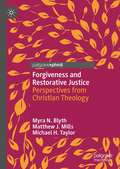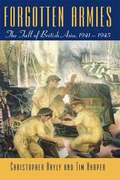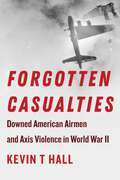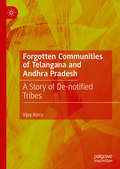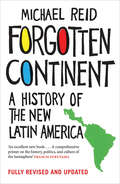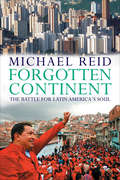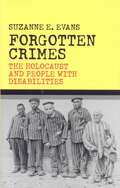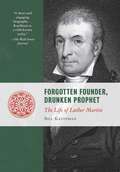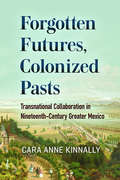- Table View
- List View
Forging Rights in a New Democracy
by Anna FournierThe last two decades have been marked by momentous changes in forms of governance throughout the post-Soviet region. Ukraine's political system, like those of other formerly socialist states of Eastern Europe, has often been characterized as being "in transition," moving from a Soviet system to one more closely aligned with Western models. Anna Fournier challenges this view, investigating what is increasingly recognized as a critical aspect of contemporary global rights discourse: the active involvement of young people living in societies undergoing radical change. Fournier delineates a generation simultaneously embracing various ideological stances in an attempt to make sense of social conditions marked by the disjuncture between democratic ideals and the everyday realities of growing economic inequality.Based on extensive fieldwork in public and private schools in the Ukrainian capital city of Kyiv, Forging Rights in a New Democracy explores high-school-aged students' understanding of rights and justice, and the ways they interpret and appropriate discourses of citizenship and civic values in the educational setting and beyond. Fournier's rich ethnographic account assesses the impact on the making of citizens of both formal and informal pedagogical practices, in schools and on the streets. Chronicling her subjects' encounters with state representatives and "violent entrepreneurs" as well as their involvement in peaceful protests alongside political activists, Fournier demonstrates the extent to which young people both reproduce and challenge the liberal discourse of rights in ways that illuminate the everyday paradoxes of market democracy. By tracking students' active participation in larger contests about the nature of liberty and entitlement in the context of redefined rights, her book provides insight into emergent configurations of citizenship in the New Europe.
Forging Romantic China
by Peter J. KitsonThe first major cultural study to focus exclusively on this decisive period in modern British-Chinese relations. Based on extensive archival investigations, Peter J. Kitson shows how British knowledge of China was constructed from the writings and translations of a diverse range of missionaries, diplomats, travellers, traders, and literary men and women during the Romantic period. The new perceptions of China that it gave rise to were mediated via a dynamic print culture to a diverse range of poets, novelists, essayists, dramatists and reviewers, including Jane Austen, Thomas Percy, William Jones, S. T. Coleridge, George Colman, Robert Southey, Charles Lamb, William and Dorothy Wordsworth and others, informing new British understandings and imaginings of China on the eve of the Opium War of 1839–42. Kitson aims to restore China to its true global presence in our understandings of the culture and literature of Britain in the late eighteenth and early nineteenth centuries.
Forging Stalin's Army: Marshal Tukhachevsky And The Politics Of Military Innovation
by Sally W StoeckerThis innovative study examines the early years of the Red Army as it developed from a revolutionary partisan force into a modern, professional institution under the leadership of Mikhail Tukhachevsky, an important and controversial figure in the politics of the Stalin period. Sally Stoecker combines her institutional analysis of the formative period of the Soviet military with an astute look at the person and political maneuvers of Marshal Tukhachevsky and his complex relationship with Stalin, which eventually led to his spectacular downfall and execution in the Great Terror of the late 1930s. }This innovative study examines the early years of the Red Army as it developed from a revolutionary partisan force into a modern, professional institution under the leadership of Mikhail Tukhachevsky, an important and controversial figure in the politics of the Stalin period. Sally Stoecker combi nes her institutional analysis of the formative period of the Soviet military with an astute look at the person and political maneuvers of Marshal Tukhachevsky and his complex relationship with Stalin, which eventually led to his spectacular downfall and execution in the Great Terror of the late 1930s.Based on newly available archival materials, the book will be welcomed not only by military historians but also by Russian historians for the light it sheds on a vital area of Soviet political history. }
Forging Transnational Belonging through Informal Trade: Thriving Markets in Times of Crisis (Southeast European Studies)
by Sandra King-SavicAnalyzing informal trading practices and smuggling through the case study of Novi Pazar, this book explores how societies cope when governments no longer assume the responsibility for providing welfare to their citizens. How do economic transnational practices shape one’s sense of belonging in times of crisis/precarity? Specifically, how does the collapse of the Ottoman Empire – and the subsequent migration of the Muslim Slav population to Turkey – relate to the Yugoslav Succession Wars during the 1990s? Using the case study of Novi Pazar, a town in Serbia that straddles the borders of Montenegro, Serbia and Kosovo that became a smuggling hub during the Yugoslav conflict, the book focuses on that informal market economy as a prism through which to analyze the strengthening of existing relations between the émigré community in Turkey and the local Bosniak population in the Sandžak region. Demonstrating the interactive nature of relations between the state and local and émigré communities, this book will be of interest to scholars and students interested in Southeastern Europe or the Yugoslav Succession Wars of the 1990s, as well as social anthropologists who are working on social relations and deviant behavior.
Forging Trust Communities: How Technology Changes Politics
by Irene S. WuTwenty historical case studies reveal how communication technology allows people to trust one another while mobilizing around a shared cause.Bloggers in India used social media and wikis to broadcast news and bring humanitarian aid to tsunami victims in South Asia. Terrorist groups like ISIS pour out messages and recruit new members on websites. The Internet is the new public square, bringing to politics a platform on which to create community at both the grassroots and bureaucratic level. Drawing on historical and contemporary case studies from more than ten countries, Irene S. Wu’s Forging Trust Communities argues that the Internet, and the technologies that predate it, catalyze political change by creating new opportunities for cooperation. The Internet does not simply enable faster and easier communication, but makes it possible for people around the world to interact closely, reciprocate favors, and build trust. The information and ideas exchanged by members of these cooperative communities become key sources of political power akin to military might and economic strength. Wu illustrates the rich world history of citizens and leaders exercising political power through communications technology. People in nineteenth-century China, for example, used the telegraph and newspapers to mobilize against the emperor. In 1970, Taiwanese cable television gave voice to a political opposition demanding democracy. Both Qatar (in the 1990s) and Great Britain (in the 1930s) relied on public broadcasters to enhance their influence abroad. Additional case studies from Brazil, Egypt, the United States, Russia, India, the Philippines, and Tunisia reveal how various technologies function to create new political energy, enabling activists to challenge institutions while allowing governments to increase their power at home and abroad. Forging Trust Communities demonstrates that the way people receive and share information through network communities reveals as much about their political identity as their socioeconomic class, ethnicity, or religion. Scholars and students in political science, public administration, international studies, sociology, and the history of science and technology will find this to be an insightful and indispensable work.
Forging a Laboring Race: The African American Worker in the Progressive Imagination (Culture, Labor, History #11)
by Paul R.D. LawrieForegrounds the working black body as both a category of analysis and lived experience“How does it feel to be a problem?” asked W.E.B. DuBois in The Souls of Black Folk. For many thinkers across the color line, the “Negro problem” was inextricably linked to the concurrent “labor problem,” occasioning debates regarding blacks’ role in the nation’s industrial past, present and future. With blacks freed from the seemingly protective embrace of slavery, many felt that the ostensibly primitive Negro was doomed to expire in the face of unbridled industrial progress. Yet efforts to address the so-called “Negro problem” invariably led to questions regarding the relationship between race, industry and labor writ large. In consequence, a collection of thinkers across the natural and social sciences developed a new culture of racial management, linking race and labor to color and the body. Evolutionary theory and industrial management combined to identify certain peoples with certain forms of work and reconfigured the story of races into one of development and decline, efficiency and inefficiency, and the thin line between civilization and savagery.Forging a Laboring Race charts the history of an idea—race management—building on recent work in African American, labor, and disability history to analyze how ideas of race, work, and the “fit” or “unfit” body informed the political economy of early twentieth-century industrial America.
Forging a Multinational State: State Making in Imperial Austria from the Enlightenment to the First World War
by John DeakThe Habsburg Monarchy ruled over approximately one-third of Europe for almost 150 years. Previous books on the Habsburg Empire emphasize its slow decline in the face of the growth of neighboring nation-states. John Deak, instead, argues that the state was not in eternal decline, but actively sought not only to adapt, but also to modernize and build. Deak has spent years mastering the structure and practices of the Austrian public administration and has immersed himself in the minutiae of its codes, reforms, political maneuverings, and culture. He demonstrates how an early modern empire made up of disparate lands connected solely by the feudal ties of a ruling family was transformed into a relatively unitary, modern, semi-centralized bureaucratic continental empire. This process was only derailed by the state of emergency that accompanied the First World War. Consequently, Deak provides the reader with a new appreciation for the evolving architecture of one of Europe's Great Powers in the long nineteenth century.
Forging a President: How the Wild West Created Teddy Roosevelt
by William Hazelgrove"There are few sensations I prefer to that of galloping over these rolling limitless prairies, with rifle in hand, or winding my way among the barren, fantastic and grimly picturesque deserts of the so-called Bad Lands." —Theodore Roosevelt <P><P>He was born a city boy in Manhattan; but it wasn't until he lived as a cattle rancher and deputy sheriff in the wild country of the Dakota Territory that Theodore Roosevelt became the man who would be president. "I have always said I would not have been president had it not been for my experience in North Dakota," Roosevelt later wrote. <P><P>It was in the "grim fairyland" of the Bad Lands that Roosevelt became acquainted with the ways of cowboys, Native Americans, trappers, thieves, and wild creatures--and it was there that his spirit was forged and tested. <P><P>In Forging a President, author William Hazelgrove uses Roosevelt's own reflections to immerse readers in the formative seasons that America's twenty-sixth president spent in "the broken country" of the Wild West.
Forging an Integrated Europe
by Barry Eichengreen Jeffry FriedenAs European integration has deepened and become more invasive, the tension between the authority of the European Union and the autonomy of member states has increased, while dissatisfaction with the political institutions of the European Union has increased dramatically. How fast and how far European integration will proceed are critical issues for scholars and policymakers in Europe and the United States. Barry Eichengreen and Jeffry Frieden have assembled a group of prominent economists and political scientists to discuss the most important--and most difficult--political and economic issues involved in European integration. The book focuses on three major issues: economic and monetary union, the reform and development of responsive political institutions for the Union, and the enlargement of the Union to include states to the east. In examining these issues, the writers consider such prob-lems as the trade-off between the benefits of international economic cooperation and the ability to pursue domestic welfare policies; how to increase the political accountability of the institutions of the EU; and how the EU can both be enlarged in membership and deepened in terms of the powers given community institutions.
Forging the Atomic Shield: Excerpts From the Office Diary of Gordon E. Dean
by Roger M. AndersSoon after his appointment as chairman of the U.S. Atomic Energy Commission in 1950, Gordon E. Dean began an office diary composed primarily of notes from his telephone conversations. The diary contains Dean's accounts of the mobilization of atomic energy for the Korean War, the decision to conduct atmospheric nuclear weapons tests in the U.S., the development and testing of the first thermonuclear device, the decisions to erect vast plants for the production of atomic weapons, the Rosenberg atom spy case, and other critical issues.Originally published in 1987. A UNC Press Enduring Edition -- UNC Press Enduring Editions use the latest in digital technology to make available again books from our distinguished backlist that were previously out of print. These editions are published unaltered from the original, and are presented in affordable paperback formats, bringing readers both historical and cultural value.
Forging the Franchise: The Political Origins of the Women's Vote
by Dawn Langan TeeleThe important political motivations behind why women finally won the right to voteIn the 1880s, women were barred from voting in all national-level elections, but by 1920 they were going to the polls in nearly thirty countries. What caused this massive change? Why did male politicians agree to extend voting rights to women? Contrary to conventional wisdom, it was not because of progressive ideas about women or suffragists’ pluck. In most countries, elected politicians fiercely resisted enfranchising women, preferring to extend such rights only when it seemed electorally prudent and in fact necessary to do so. Through a careful examination of the tumultuous path to women’s political inclusion in the United States, France, and the United Kingdom, Forging the Franchise demonstrates that the formation of a broad movement across social divides, and strategic alliances with political parties in competitive electoral conditions, provided the leverage that ultimately transformed women into voters.As Dawn Teele shows, in competitive environments, politicians had incentives to seek out new sources of electoral influence. A broad-based suffrage movement could reinforce those incentives by providing information about women’s preferences, and an infrastructure with which to mobilize future female voters. At the same time that politicians wanted to enfranchise women who were likely to support their party, suffragists also wanted to enfranchise women whose political preferences were similar to theirs. In contexts where political rifts were too deep, suffragists who were in favor of the vote in principle mobilized against their own political emancipation.Exploring tensions between elected leaders and suffragists and the uncertainty surrounding women as an electoral group, Forging the Franchise sheds new light on the strategic reasons behind women’s enfranchisement.
Forging the Iron Lady: Margaret Thatcher, the 1970s, and the Origins of Neoliberalism (Routledge Studies in British Politics)
by Terrence CaseyThis book tells the story of the rise of Margaret Thatcher in the context of crises assailing Britain in the 1970s and how her ascent to power ushered in the neoliberal era.Forging the Iron Lady details her journey from relative obscurity to the pinnacle of power as a collective, as well as personal, tale and how an uncertain chain of events, influenced through ideas and political agency, opened the path to certain outcomes while throwing up barriers to others. It is her “origin story” as the Iron Lady. It examines a dramatic phase in her political advance and how the tumultuous politics of the 1970s shaped her as a politician and her political ideals, and how the conditions necessary to bring about major political-economic changes were created, leading to three decades of neoliberalism. In doing so, this book offers a better understanding of the political conditions needed for a change in political-economic orders.This book is of key interest to scholars, students, and readers of British politics and history, Thatcherism, political parties, elections, executive, and elite politics.
Forging the Kingdom: Power in English Society, 973–1189
by Green Judith A.Between the imperial coronation of Edgar in 973 and the death of Henry II in 1189, English society was transformed. This lively and wide-ranging study explores social and political change in England across this period, and examines the reasons for such developments, as well as the many continuities. By putting the events of 1066 firmly in the middle of her account, Judith Green casts new light on the significance of the Norman Conquest. She analyses the changing ways that kings, lords and churchmen exercised power, especially through the building of massive stone cathedrals and numerous castles, and highlights the importance of London as the capital city. The book also explores themes such as changes in warfare, the decline of slavery and the integration of the North and South West, as well as concepts such as state, nationalism and patriarchy.
Forging the Sword
by Benjamin JensenAs entrenched bureaucracies, military organizations might reasonably be expected to be especially resistant to reform and favor only limited, incremental adjustments. Yet, since 1945, the U.S. Army has rewritten its capstone doctrine manual, Operations, fourteen times. While some modifications have been incremental, collectively they reflect a significant evolution in how the Army approaches warfare--making the U.S. Army a crucial and unique case of a modern land power that is capable of change. So what accounts for this anomaly? What institutional processes have professional officers developed over time to escape bureaucracies' iron cage? Forging the Sword conducts a comparative historical process-tracing of doctrinal reform in the U.S. Army. The findings suggest that there are unaccounted-for institutional facilitators of change within military organizations. Thus, it argues that change in military organizations requires "incubators," designated subunits established outside the normal bureaucratic hierarchy, and "advocacy networks" championing new concepts. Incubators, ranging from special study groups to non-Title 10 war games and field exercises, provide a safe space for experimentation and the construction of new operational concepts. Advocacy networks then connect different constituents and inject them with concepts developed in incubators. This injection makes changes elites would have otherwise rejected a contagious narrative.
Forging the World: Strategic Narratives and International Relations
by Laura Roselle Alister Miskimmon Ben O'LoughlinForging the World brings together leading scholars in International Relations (IR) and Communication Studies to investigate how, when, and why strategic narratives shape the structure, politics, and policies of the global system. Put simply, strategic narratives are tools that political actors employ to promote their interests, values, and aspirations for the international order by managing expectations and altering the discursive environment. These narratives define “who we are” and “what kind of world order we want.”
Forgive Us Our Trespasses (Brooke Burrell)
by Tom AvitabileThe bruise on the young goalie's cheek got girls high school soccer coach Brooke Burrell's attention. Brooke tries to keep her advantage as the most decorated woman agent ever in government service at bay while dealing with the suspected abusive father – although she'd love to punch his lights out. Her digging reveals the reason for his abusiveness and it connects to a massive international terrorist attack. When the father is found dead, Brooke is accused of the murder. Suddenly, she is forced to defend herself in court, and in the court of public opinion – while trying to stop the insidious plot to kill hundreds of thousands of innocent people across the globe in one terrifying instant and bring the western world to its knees. Filled with the nonstop thrills, all-too-real scenarios, and remarkable attention to detail that has made Tom Avitabile a consistent #1 bestseller, Forgive Us Our Trespasses is edge-of-your-seat storytelling of the first order.
Forgiveness and Restorative Justice: Perspectives from Christian Theology
by Myra N. Blyth Matthew J. Mills Michael H. TaylorThe meaning of ‘forgiveness’ and its role within restorative justice are highly contested. This book offers analysis from practical and academic perspectives within Christian theology, against a rich canvas of related concepts, including victimhood, sin, love, and vulnerability. Critical friends of restorative justice, the authors argue that forgiveness – whether as journey or act, unilateral or mutual, conditional or unconditional – is necessary to achieving a fully restorative resolution to acts of harm. They also suggest that Christianity, with its meaning-giving metanarrative of restoration, and preference for communitarian approaches to justice, may have epistemic value for evaluating and even deepening the theory and practice of restorative justice.
Forgotten Armies: The Fall Of British Asia, 1941-1945
by Tim Harper Christopher BaylyIn the early stages of the Second World War, the vast crescent of British-ruled territories stretching from India to Singapore appeared as a massive Allied asset. It provided scores of soldiers and great quantities of raw materials and helped present a seemingly impregnable global defense against the Axis. Yet, within a few weeks in 1941-42, a Japanese invasion had destroyed all this, sweeping suddenly and decisively through south and southeast Asia to the Indian frontier, and provoking the extraordinary revolutionary struggles which would mark the beginning of the end of British dominion in the East and the rise of today's Asian world. More than a military history, this gripping account of groundbreaking battles and guerrilla campaigns creates a panoramic view of British Asia as it was ravaged by warfare, nationalist insurgency, disease, and famine. It breathes life into the armies of soldiers, civilians, laborers, businessmen, comfort women, doctors, and nurses who confronted the daily brutalities of a combat zone which extended from metropolitan cities to remote jungles, from tropical plantations to the Himalayas. Drawing upon a vast range of Indian, Burmese, Chinese, and Malay as well as British, American, and Japanese voices, the authors make vivid one of the central dramas of the twentieth century: the birth of modern south and southeast Asia and the death of British rule.
Forgotten Casualties: Downed American Airmen and Axis Violence in World War II (World War II: The Global, Human, and Ethical Dimension)
by Kevin T HallSheds new light on the mistreatment of downed airmen during World War II and the overall relationship between the air war and state-sponsored violence.Throughout the vast expanse of the Pacific, the remoteness of Southeast Asia, and the rural and urban communities in Nazi-occupied Europe, more than 120,000 American airmen were shot down over enemy territory during World War II, thousands of whom were mistreated and executed. The perpetrators were not just solely fanatical soldiers or Nazi zealots but also ordinary civilians triggered by the death and devastation inflicted by the war. In Forgotten Casualties, author Kevin T Hall examines Axis violence inflicted on downed Allied airmen during this global war.Compared with all other armed conflicts, World War II exhibited the most widespread and ruthless violence committed against airmen. Flyers were deemed guilty because of their association with the Allied air forces, and their fate remained in the hands of their often-hostile captors. Axis citizens angered by the devastation inflicted by the war, along with the regimes’ consent and often encouragement of citizens to take matters into their own hands, resulted in thousands of Allied flyers’ being mistreated and executed by enraged civilians. Written to help advance the relatively limited discourse on the mistreatment against flyers in World War II, Forgotten Casualties is the first book to analyze the Axis violence committed against Allied airmen in a comparative, international perspective. Effectively comparing and contrasting the treatment of POWs in Germany with that of their counterparts in Japan, Hall’s thorough analysis of rarely seen primary and secondary sources sheds new light on the largely overlooked complex relationship among the air war, propaganda, the role of civilians, and state-sponsored terror during the radicalized conflict. Sources include postwar trial testimonies, Missing Air Crew Reports (MACR), Escape and Evasion reports, perpetrators’ explanations and rationalizations for their actions, extensive judicial sources, transcripts of court proceedings, autopsy reports, appeals for clemency, and justifications for verdicts.Drawing heavily on airmen’s personal accounts and the testimonies of both witnesses and perpetrators from the postwar crimes trials, Forgotten Casualties offers a new narrative of this largely overlooked aspect of Axis violence.
Forgotten Communities of Telangana and Andhra Pradesh: A Story of De-notified Tribes
by Vijay KorraThe book discusses the socio-cultural-historical, occupational, educational, employment and discriminatory status of one of the most neglected and marginalised communities: the de-notified tribes or ex-criminal tribes of Telangana and Andhra Pradesh. Based on primary data collected from 14 communities in 11 districts in these states, it discusses the current state of affairs concerning de-notified tribes. There is no accurate and comprehensive information available on the present socio-economic status of these communities, either in the literature or with government agencies. This book provides valuable information on how they are faring in post-independence India since their de-notification from the Criminal Tribes Act, 1871.
Forgotten Continent: A History of the New Latin America
by Michael ReidThe bestselling primer on the social, political, and economic challenges facing Central and South America—now fully revised and updated. Ten years after its first publication, Michael Reid&’s bestselling survey of the state of contemporary Latin America has been wholly updated to reflect the new realities of the &“Forgotten Continent.&” The former Americas editor for the Economist, Reid suggests that much of Central and South America, though less poor, less unequal, and better educated than before, faces harder economic times now that the commodities boom of the 2000s is over. His revised, in-depth account of the region reveals dynamic societies more concerned about corruption and climate change, the uncertainties of a Donald Trump-led United States, and a political cycle that, in many cases, is turning from left-wing populism to center-right governments. This essential new edition provides important insights into the sweeping changes that have occurred in Latin America in recent years and indicates priorities for the future. &“[A] comprehensive and erudite assessment of the region . . . While the social and economic face of Latin America is becoming more attractive, political life remains ugly and, in some countries, is getting even uglier.&”—The Washington Post &“Excellent . . . a comprehensive primer on the history, politics, and culture of the hemisphere.&”—Francis Fukuyama, New York Times bestselling author &“Reid&’s book offers something valuable to both specialists and the general reading public . . . He writes of Latin America with great empathy, intelligence, and insight.&”—Hispanic American Historical Review
Forgotten Continent: The Battle For Latin America's Soul
by Michael ReidThe bestselling primer on the social, political, and economic challenges facing Central and South America by The Economist editor and author of Brazil. Latin America has often been condemned to failure. Neither poor enough to evoke Africa&’s moral crusade, nor as explosively booming as India and China, it has largely been overlooked by the West. Yet this vast continent, home to half a billion people, the world&’s largest reserves of arable land, and 8.5 percent of global oil, is busily transforming its political and economic landscape. This book argues that rather than failing the test, Latin America&’s efforts to build fairer and more prosperous societies make it one of the world&’s most vigorous laboratories for capitalist democracy. In many countries—including Brazil, Chile and Mexico—democratic leaders are laying the foundations for faster economic growth and more inclusive politics, as well as tackling deep-rooted problems of poverty, inequality, and social injustice. They face a new challenge from Hugo Chávez&’s oil-fueled populism, and much is at stake. Failure will increase the flow of drugs and illegal immigrants to the United States and Europe, jeopardize stability in a region rich in oil and other strategic commodities, and threaten some of the world&’s most majestic natural environments. Drawing on Michael Reid&’s many years of reporting from inside Latin America&’s cities, presidential palaces, and shantytowns, the book provides a vivid, immediate, and informed account of a dynamic continent and its struggle to compete in a globalized world. &“No one who seriously aspires to discuss Latin American politics, economics, and culture should go without reading Forgotten Continent.&”—National Interest
Forgotten Crimes: The Holocaust And People With Disabilities
by Suzanne E. EvansBetween 1939 and 1945 the Nazi regime systematically murdered hundreds of thousands of children and adults with disabilities as part of its "euthanasia" programs. These programs were designed to eliminate all persons with disabilities who, according to Nazi ideology, threatened the health and purity of the German race. Forgotten Crimes explores the development and workings of this nightmarish process, a relatively neglected aspect of the Holocaust. Suzanne Evans's account draws on the rich historical record as well as scores of exclusive interviews with disabled Holocaust survivors. It begins with a description of the Nazis' Children's Killing Program, in which tens of thousands of children with mental and physical disabilities were murdered by their physicians, usually by starvation or lethal injection. The book goes on to recount the T4 euthanasia program, in which adults with disabilities were disposed of in six official centers, and the development of the Sterilization Law that allowed the forced sterilization of at least a half-million young adults with disabilities. Ms. Evans provides portraits of the perpetrators and accomplices of the killing programs, and investigates the curious role of Switzerland's rarely discussed exclusionary immigration and racially eugenic policies. Finally, Forgotten Crimes notes the inescapable implications of these Nazi medical practices for our present-day controversies over eugenics, euthanasia, genetic engineering, medical experimentation, and rationed health care.
Forgotten Founder, Drunken Prophet: The Life of Luther Martin (Lives of the Founders)
by Bill KauffmanThe Anti-Federalist Luther Martin of Maryland is known to us—if he is known at all—as the wild man of the Constitutional Convention: a verbose, frequently drunken radical who annoyed the hell out of James Madison, George Washington, Gouverneur Morris, and the other giants responsible for the creation of the Constitution in Philadelphia that summer of 1787. In Bill Kauffman's rollicking account of his turbulent life and times, Martin is still something of a fitfully charming reprobate, but he is also a prophetic voice, warning his heedless contemporaries and his amnesiac posterity that the Constitution, whatever its devisers' intentions, would come to be used as a blueprint for centralized government and a militaristic foreign policy. In Martin's view, the Constitution was the tool of a counterrevolution aimed at reducing the states to ciphers and at fortifying a national government whose powers to tax and coerce would be frightening. Martin delivered the most forceful and sustained attack on the Constitution ever levied—a critique that modern readers might find jarringly relevant. And Martin's post-convention career, though clouded by drink and scandal, found him as defense counsel in two of the great trials of the age: the Senate trial of the impeached Supreme Court justice Samuel Chase and the treason trial of his friend Aaron Burr. Kauffman's Luther Martin is a brilliant and passionate polemicist, a stubborn and admirable defender of a decentralized republic who fights for the principles of 1776 all the way to the last ditch and last drop. In remembering this forgotten founder, we remember also the principles that once animated many of the earliest—and many later—American patriots.
Forgotten Futures, Colonized Pasts: Transnational Collaboration in Nineteenth-Century Greater Mexico
by Cara Anne KinnallyForgotten Futures, Colonized Pasts traces the existence of a now largely forgotten history of inter-American alliance-making, transnational community formation, and intercultural collaboration between Mexican and Anglo American elites. This communion between elites was often based upon Mexican elites’ own acceptance and reestablishment of problematic socioeconomic, cultural, and ethno-racial hierarchies that placed them above other groups—the poor, working class, indigenous, or Afro-Mexicans, for example—within their own larger community of Greater Mexico. Using close readings of literary texts, such as novels, diaries, letters, newspapers, political essays, and travel narratives produced by nineteenth-century writers from Greater Mexico, Forgotten Futures, Colonized Pasts brings to light the forgotten imaginings of how elite Mexicans and Mexican Americans defined themselves and their relationship with Spain, Mexico, the United States, and Anglo America in the nineteenth century. These “lost” discourses—long ago written out of official national narratives and discarded as unrealized or impossible avenues for identity and nation formation—reveal the rifts, fractures, violence, and internal colonizations that are a foundational, but little recognized, part of the history and culture of Greater Mexico. Published by Bucknell University Press. Distributed worldwide by Rutgers University Press.
